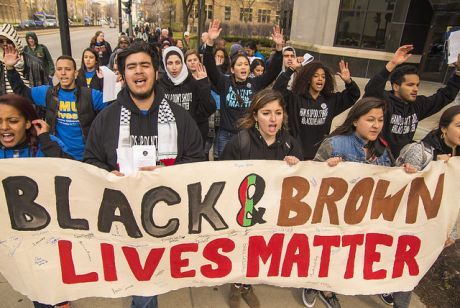Features
You are here
Stop racist carding

October 3, 2015
Although, we often like to think of Canada as a paragon of inclusion and tolerance while scoffing at the US for its lack of racial harmony, it seems that our sanctimonious attitude about race has for too long swept under the carpet.
When discussions pertaining to race arise in this country, we are quick to remind the world and ourselves that race riots, police brutality and the mass incarceration of minorities are not “a thing” in Canada. This adherence to a Canadian national myth steeped in self-glorification is blurring the lines between fantasy and reality.
In our haste to declare our society multicultural and tolerant, we ignore Canada’s history of colonization and slavery, the appalling treatment of Canada’s Aboriginal population and the systemic discrimination found at every level of Canadian society.
Systemic racism, abject poverty, lack of opportunity, social isolation and violence are part and parcel of the Canadian underbelly. The present Canadian political climate — both at a Federal and provincial level — has been particularly instrumental in facilitating the adoption of policies that target and criminalize Aboriginal peoples, Muslims, racialized Canadians and low-income communities.
While Bill-C51 garnered much attention in the media and has triggered many discussions, pernicious provincial policies such as carding have gone unnoticed by many Canadians.
Carding
Ontario, under the leadership of Premier Wynne’s Liberal government is seeking to introduce province-wide regulations on carding.
Carding, or “street checks,” refers to the police practice of stopping and checking the identification of people who are not suspected of a crime, and imputing the gathered personal information into a police database. The people who get carded can then end up with records susceptible of coming up in background checks.
For many of its opponents, this police practice is reminiscent of New York’s infamous Stop and Frisk program, which was later deemed unconstitutional and abolished. In fact, Ontario’s Ombudsman Andre Marin has called carding and illegal measure stating,“Whatever benefit the police get out of it is overwhelmed by the breach of individual liberty involved in carding.”
Carding has long been criticized for being an outlet that facilitates and legitimizes racial profiling in policing. According to the Ottawa Police Service own data, Black and Middle Eastern men are overrepresented in the overall cases of carding from 2011 to 2014. In a city where Blacks make up only 5.7 per cent of the population and those of Middle Eastern ancestry less than 5 per cent, they represent respectively 20 per cent and 14 per cent of those being carded.
Yet, when given the chance to question the Ottawa Police chief about these findings the civilian board that oversees the Ottawa Police Service chose to not ask a single question on this matter, approving instead the force’s review of street checks in an attempt to develop guidelines to regulate the practice.
Past
The advent of policies such as carding might seem like a worrying new trend in Ontarian politics. Sadly, nothing could be further from the truth.
The Race Relations and Policing Task Force appointed by the Solicitor General of Ontario in 1989 revealed in its report the widespread belief amongst visible minorities of not being fairly policed. In 1992 Stephen Lewis’ Report to the Premier on Racism in Ontario — especially on the issue of police and visible minority relations— determined that visible minorities, particularly African Canadians, experienced extensive discrimination in policing and the criminal justice system.
Far from being a shocking aberration in the Canadian landscape, carding is just the latest example of scores of racist and discriminatory policies that have relentlessly targeted minorities in this country.
Resistance
But there is growing awareness and resistance. While Toronto mayor John Tory thought that appointing a Black police chief and trying to “reform” carding could allow it to continue, Black Lives Matter-Toronto has continued to challenge it.
By connecting carding to police violence and anti-Black racism that permeates society, there are growing movements that are challenging this racist policy and the racist system that breeds it.
Section:










